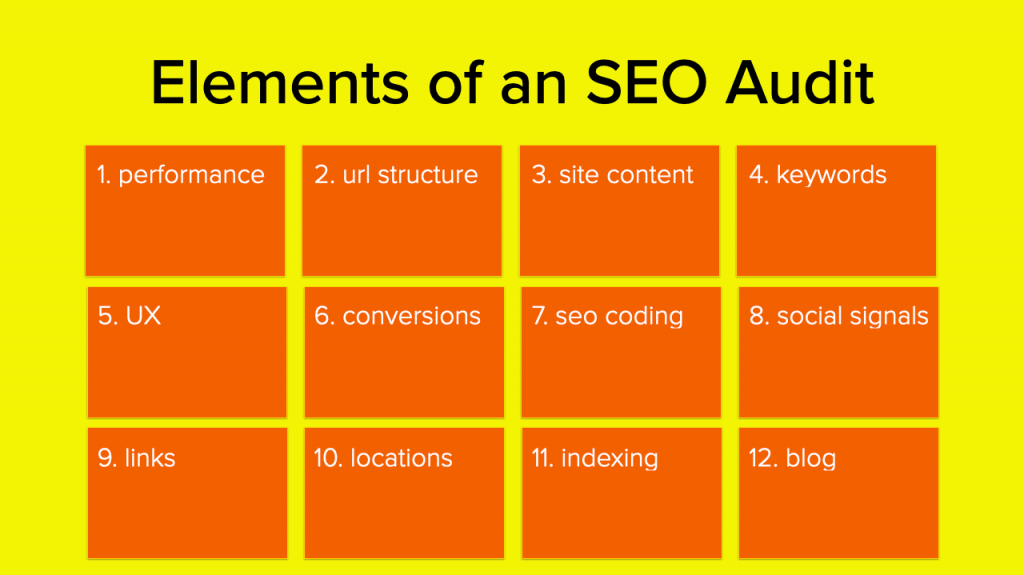| Nov 26, 2023
SEO Audit Services Agency for Manufacturers and Industrial Companies

As a leading SEO Agency for manufacturing and industrial companies, we are frequently asked to share our best practices. This is part 2 of a series of posts to explain how SEO works for manufacturing companies.
SEO or “search engine optimization” is the process of improving your website to increase its visibility on Google, Bing and other international search engines.
Manufacturers that pursue and achieve top organic or natural Google and Bing rankings prosper and thrive. There are good reasons for this. Organic rankings are more trusted, more clicked and out-convert paid advertising leads three-fold. Being found on page one is the best means for finding, getting, keeping and growing customers and talent.
Smart marketers at leading manufacturing companies begin their SEO journey by conducting a twelve-point SEO audit to assess the following:
1. Website Performance Metrics Audit
They begin by testing site load speed, mobile/desktop performance, secure certificate and domain name analysis. They know that these are all Google and Bing ranking factors.
2. Website URL Structure Audit
Leading manufacturing company marketers ensure that the URL structure is rational, descriptive and hierarchical. A good URL structure will accelerate attainment of stronger rankings and simplify analysis of website performance in Google analytics.
For international search rankings, they ensure country-specific domains or or language-specific sites are being leveraged.
3. Website Copy and Content Audit
The successful industrial companies know that the website copy must persuade prospective buyers, reassure current customers and inform/influence Google and Bing bots. It must also be infused with appropriate keywords and keyword derivatives.
For international search rankings, they ensure that translated copy exists in country-specific languages.
4. Keyword Audit
The premier manufacturing company marketers evaluate keywords on all website pages. They detect keyword stuffing, an illicit SEO technique in which keywords are loaded into a web page’s meta tags, visible content, or link anchor text in an attempt to gain an unfair ranking advantage. They are aware that at best, search engines disregard keyword stuffing and, at worst, penalize a website if it’s packed with too much, irrelevant or unrelated content.
5. User Experience Audit
Chief manufacturing company marketers are aware that Google and Bing bots reward websites with superior user experience, information architecture and page architecture – for buyers and channel partners alike. They evaluate it carefully.
6. Conversion Architecture Audit
The principal industrial companies are aware that if a website is a manufacturer’s #1 salesperson, it must be efficiently constructed to maximize lead and e-commerce order generation, signing up for newsletters and webinars, accessing thought-leadership content behind registration walls. And if the website is a manufacturer’s service extension, it must efficiently steer customers to after-sales service and knowledge base portals. It must also serve all channel partners with efficiency and grace.
7. SEO Coding Audit
The manufacturing company marketing leaders know that websites are built with HTML and CSS (Cascading Style Sheets) which are instructions to browsers to determine characteristics of web page elements such as text size, position of elements on the page, etc. Furthermore, ADA WCAG 2.1 standards dictate accessibility compliance for various audiences. They know that websites must be constructed with best practices because Google and Bing both reward them and penalize websites that don’t.
8. Social Signals Audit
The chief manufacturing company marketers know that presence of social sharing buttons and open-graph (OG) tags facilitates content sharing which is a Google, Bing and international ranking factor. They ensure that they are present.
9. Internal and External Links Audit
The smart industrial company marketers know that while it’s true that internal site-links and in-bound links are the backbone of Google’s ranking algorithm, outbound links also play an important role. They ensure only highest quality links exist and itemize poor quality links for subsequent link-pruning.
10. Locations Audit
Smart manufacturing companies serving certain geographies embed locations signals for those geographies into its website copy.
11. Indexing Audit
Successful manufacturers check for site indexing issues using tools like Google Search Console and verify that critical pages are all indexed.
12. Blog Audit
The effective manufacturing company marketers are aware that blogs are one of the most effective means of securing and lifting Google and Bing page one rankings. They audit its categories, tags and content to reveal areas of improvement.
Armed with the audit, marketers at manufacturing companies are ready to do the hard work of crafting a keyword strategy.
If you are a busy manufacturing company marketer seeking a smart manufacturing marketing agency which can offload your work and help you join the elite group of manufacturers growing their company’s share of mind, voice and market, please contact us.
